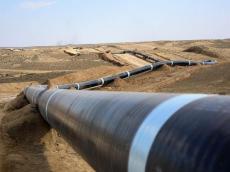|
|
TODAY.AZ / Business
Azerbaijan boosts natural gas transport
23 September 2022 [16:59] - TODAY.AZ

By Azernews
By Ayya Lmahamad
Azerbaijan increased natural gas transport through the main gas pipelines by 12.8 percent, to 25.5 billion cubic meters in January-August 2022, Azernews reports.
The South Caucasus Pipeline (also known as the Baku-Tbilisi-Erzurum pipeline) carried 52.7 percent of the natural gas. In the first eight months of the year, this pipeline transported 13.4 billion cubic meters of natural gas.
Moreover, during the reporting period, 24.5 million tons of oil were transported through Azerbaijan's main oil pipelines.
The Baku-Tbilisi-Ceyhan (BTC) oil pipeline transported 79 percent of the oil or 19.2 million tons. In addition, in January-August, BTC transported 3.1 million tons of transit oil.
The South Caucasus Pipeline was built to transport Azerbaijan's Shah Deniz gas to Georgia and Turkey. The pipeline begins near Baku at the Sangachal terminal. It follows the BTC crude oil pipeline route through Azerbaijan and Georgia to Turkey, where it connects to the Turkish gas distribution system. Since late 2006, the pipeline has been transporting gas from Shah Deniz Stage 1 to Azerbaijan, Georgia, and, beginning July 2007 to Turkey.
The BTC pipeline transports Azerbaijani oil from the Caspian Sea to the Turkish port of Ceyhan, then to European markets via the Mediterranean Sea. The BTC oil pipeline was officially inaugurated in Turkey on July 13, 2006. The pipeline is 1,768 km long in total, with 443 km passing through Azerbaijan, 249 km passing through Georgia, and 1076 km passing through Turkey. The capacity is expected to be 50 million tonnes of oil per year or 1 million barrels per day. BTC transports light oil produced at the Azeri-Chirag-Gunashli field.
URL: http://www.today.az/news/business/225881.html
 Print version
Print version
Connect with us. Get latest news and updates.
See Also
- 23 January 2025 [15:14]
Azerbaijan involves 13,000 people with disabilities in employment programs - 23 January 2025 [13:38]
Azerbaijan holds hybrid meeting on green energy strategy implementation - 23 January 2025 [12:38]
Azerbaijan to increase minimum pension starting February - 23 January 2025 [11:26]
Baku, Tehran sign strategic cooperation plan for Astara Terminal - 22 January 2025 [18:06]
ASCO completes 1,088 ship repairs in 2024 - 22 January 2025 [14:10]
ING Group forecasts stable CBA interest rate until late 2025 - 22 January 2025 [13:11]
Baku, Rome discuss expanding economic cooperation - 22 January 2025 [12:09]
Iran and Azerbaijan to establish joint energy working group - 21 January 2025 [18:18]
New tax legislation to strengthen market control and combat shadow economy - 21 January 2025 [14:13]
Azerbaijan's role in global energy security discussed at Davos Forum
Most Popular
 Baku builds relations with Trump
Baku builds relations with Trump
 Baku, Rome discuss expanding economic cooperation
Baku, Rome discuss expanding economic cooperation
 Turkish ambassador to Azerbaijan makes farewell visit to Western Azerbaijan Community
Turkish ambassador to Azerbaijan makes farewell visit to Western Azerbaijan Community
 Macron fancies himself a great soldier: mobilization announces in France
Macron fancies himself a great soldier: mobilization announces in France
 President Ilham Aliyev met with President of Global Affairs at Goldman Sachs Group Inc. Jared Cohen in Davos
President Ilham Aliyev met with President of Global Affairs at Goldman Sachs Group Inc. Jared Cohen in Davos
 Panic in Armenia: Does Paris want to put up with Baku?
Panic in Armenia: Does Paris want to put up with Baku?
 Azerbaijan's role in global energy security discussed at Davos Forum
Azerbaijan's role in global energy security discussed at Davos Forum
